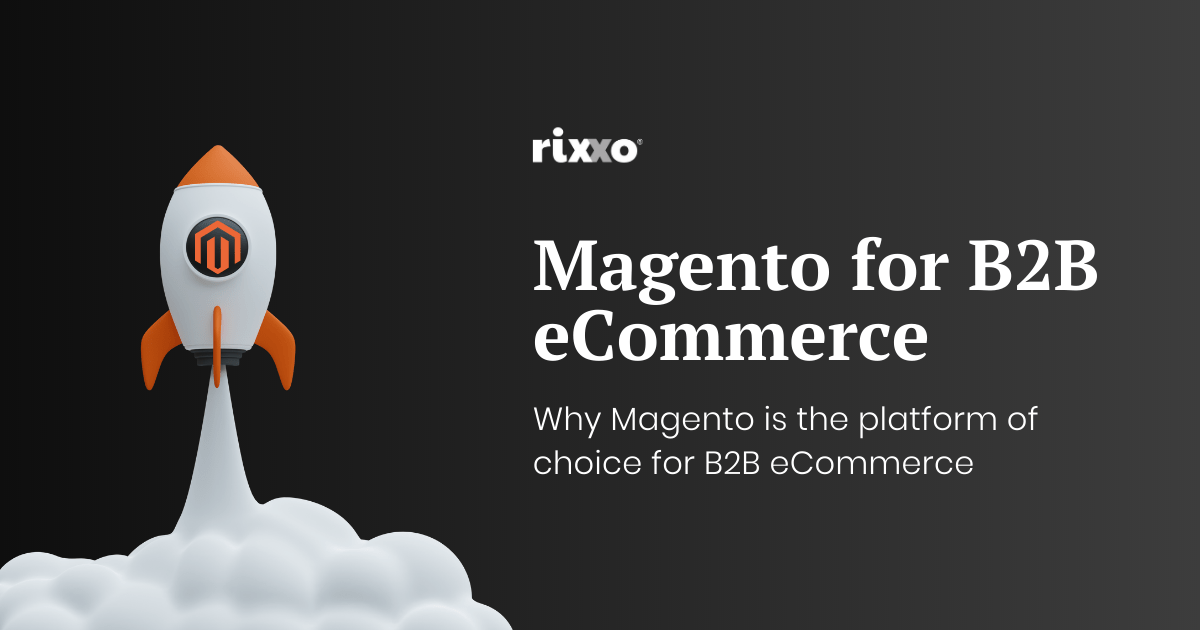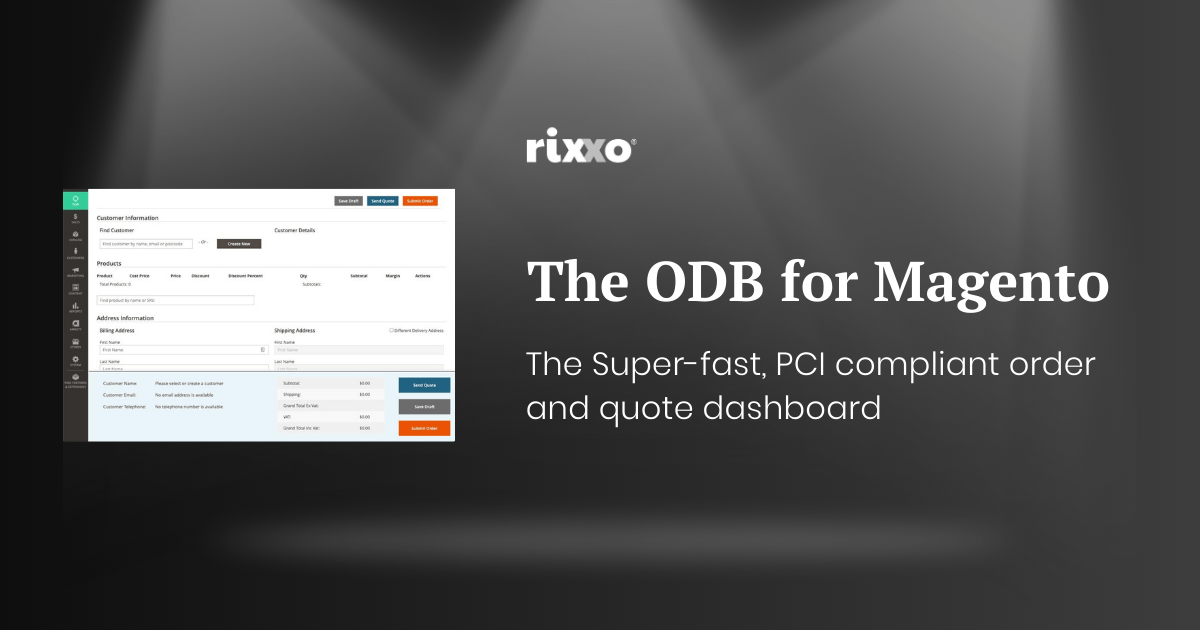Magento B2B eCommerce: Why it’s a Game Changer

Why Magento B2B eCommerce?
Launched back in 2008, Magento has become the go-to for eCommerce. But while Magento has proven its worth for B2C (business-to-consumer) companies, its features, flexibility, and scalability make it a game-changer for B2B (business-to-business) eCommerce.
Now, B2B isn’t just about selling stuff online. It’s about making business smoother, cutting costs, and building better relationships with your customers. In this piece, we’re diving deep into how Magento is shaking things up in the B2B world with its top-notch features tailored just for it. We’ll cover in detail the features and aspects of Magento that make it a unique B2B powerhouse, such as:
- Customisability and flexibility
- Community and support
- Robust B2B features
- Scalability
- Mobile Experience
Plus a bonus section on where we see potential future innovations for this dynamic platform.
With that said, let’s dive in and discover the reasons why, as a leading B2B eCommerce agency, we believe Magento is the platform of choice for B2B eCommerce.
Looking for the short / TLDR version? Skip to the summary at the bottom
1. Customisability and flexibility of Magento for B2B eCommerce


We built a super-snazzy custom leasing calculator for our Magento B2B eCommerce client.
Being open-source, Magento is incredibly adaptable and customisable, making it a top choice for B2B companies.
Open-source goodness
Open-source software means that its code is publicly accessible. “So what?” you might wonder. Well, the openness of Magento’s code offers several distinct advantages, such as:
- With the help of a developer, you can whip up custom extensions to make it even better.
- It plays nice with many B2B tools your business needs.
- And as your company grows and changes, Magento can adapt and grow with you.
Which leads us onto…
Extension & plugin haven
Because of its open-source nature, Magento’s marketplace is a treasure trove of extensions and plugins, catering for diverse needs. For B2B companies, this is especially beneficial.
They can access tools tailored for specific tasks, from bulk ordering to detailed account management. What’s more, with Magento, businesses have the flexibility to choose off-the-shelf extensions or opt for custom-developed solutions, ensuring their online store aligns perfectly with their unique business requirements.
The power of theme customisation
More than just making your store look good, theme customisation can play a central role in the success of a B2B eCommerce business, offering many tangible benefits:
Keeps branding on point: Custom themes enable businesses to ensure their online footprint reflects their core brand ethos. This consistent branding is essential, especially in the B2B world where establishing trust is pivotal for lasting partnerships.
A user experience that resonates: Designing themes tailored to B2B clients means a more intuitive interface and navigation. This can facilitate quicker decision-making and a smoother purchasing journey.
Showcase products, smarter: Given the intricate product portfolios or varied pricing tiers in B2B, custom themes can lay out this information in an easily understandable manner. Clear presentation boosts comprehension and, in turn, purchasing intent.
Tools for unique B2B demands: With B2B sales, there’s often more than just adding to cart. Think bulk orders, detailed negotiations, or specific shipping arrangements. Custom themes pave the way for these unique functionalities, ensuring a hassle-free transaction.
Staying ahead of the curve: As market dynamics shift and customer needs evolve, businesses need an online space that can adapt. This adaptability keeps the platform continually aligned with emerging business goals.
Theme customisation is about creating a digital space that’s in tune with the distinct requirements of B2B clientele, fostering deeper connections, and driving sales.
API integration
With Magento’s adaptable APIs, businesses have the tools to:
- Integrate with third-party applications like CRMs, and ERPs.
- Maintain a consistent flow of information between Magento and other enterprise systems, guaranteeing the latest data on inventory, order statuses, and customer details.
Thanks to Magento’s progressive API features, businesses can streamline processes and foster better communication between platforms. The outcome? Smoother operations, fewer mishaps, and a top-tier experience for customers.
More on this in the scaling section further down.
Custom workflows & approvals
B2B transactions often involve multiple decision-makers, each with their own criteria and concerns. Meeting the diverse needs of these stakeholders can be a challenge. Thankfully, Magento steps up to the plate:
- Bespoke workflows: tailored to specific roles and responsibilities. This ensures that every stakeholder, from procurement to management, follows a structured and efficient path that aligns with their duties and the company’s overall operational strategy.
- Multi-stage approval systems: This means whether it’s a hefty order or a unique pricing request, nothing gets the green light without the necessary reviews.
With Magento, businesses can confidently navigate the multi-layered world of B2B transactions, knowing each step is managed and vetted appropriately.
Tailored customer experiences
In the B2B world, one size does not fit all. Magento recognises this and provides businesses with the tools to offer tailored experiences, such as:
- Bespoke catalogues and pricing: Depending on the customer or their group, businesses can create unique catalogues with custom pricing structures. This personalised touch often translates to more meaningful engagements and transactions.
- Targeted content and promotions: Drawing from rich customer profiles and their purchase histories, Magento enables businesses to roll out content and promotions that resonate with the individual needs and preferences of their clients.
With these capabilities, Magento ensures that each interaction on the platform feels personal, relevant, and value-driven for B2B customers.
Magento’s open-source core offers unparalleled flexibility, especially for B2B demands. Companies can whip up unique extensions, fine-tune themes for brand consistency, and effortlessly sync with crucial enterprise tools thanks to its adaptive APIs. Mindful of the intricate nature of B2B dealings, Magento champions customised workflows and curates individualised customer journeys.
2. Community and support: Magento’s unrivalled strength


Magento stands tall not just for its feature-rich capabilities; it’s also bolstered by a thriving developer community and top-notch support.
Here’s how these elements boost what Magento brings to the eCommerce space:
Vibrant developer community
- Knowledge exchange: Got a Magento question? There’s probably someone who’s tackled it before. With a buzzing global community of developers who continuously collaborate, share insights, and exchange knowledge. This collective intelligence ensures that best practices and innovative solutions are always within reach.
- Continuous improvements: This community-driven approach means the platform is always improving, with refined features and bugs squashed.
- Forums & discussions: Platforms like the Magento Stack Exchange and the official Magento Forums serve as hubs where beginners can seek guidance, and experts can offer solutions, ensuring no one is ever truly ‘stuck’.
Support
- Official documentation: Dive into Magento’s comprehensive vault of guides and how-to’s, covering everything from getting started to advanced customisations. It’s a goldmine for anyone keen on getting the most out of Magento.
- Training & certification: Fancy becoming a Magento master? Magento U’s got courses to level up your skills. Plus, getting certified is a top way to show you know your stuff and ensure quality work.
- Partner ecosystem: Need a specialist? Magento’s got a whole network of partner pals, from tech gurus to ace Magento agencies, ready to help with whatever you throw their way.
With a thriving community of developers and an amazing network of support specialists, when you choose Magento, you’re not just selecting a platform, you’re joining a community that thrives on collaboration, innovation, and mutual growth.
3: B2B features of Magento with extensions


Speaking of Magento B2B extensions and plugins, we built a super-fast, PCI-compliant order & quote dashboard, which will change your sales teams lives for the better. Check it out here
Thanks to its open-source nature, Magento’s marketplace is brimming with a diverse range of extensions and plugins. For example, with the addition of the Aheadworks B2B suite of extensions, Magento is elevated to a B2B powerhouse for eCommerce. Let’s explore the features that make it a winner in B2B:
Custom pricing
Role-based pricing: Allows merchants to set different prices for different customer groups or individual customers. This can be helpful for businesses that have tiered pricing based on volume or longstanding partnerships.
Tier pricing: Enables bulk discounts or special pricing for customers who purchase items in large quantities.
Quoting made easy with Request for Quote
- Merchants can enable an RFQ feature, allowing buyers to negotiate prices.
- Streamlines the quotation process by letting buyers request a quote directly from the product page.
- Merchants can then manage and respond to these requests from the backend.
Quick order forms
Designed for B2B buyers who know exactly what they want and in which quantity. No need to scroll through catalogues. Buyers can quickly input product SKUs or upload CSV files to place orders.
Requisition lists
- List creation: With Magento’s Requisition Lists feature, buyers can efficiently compile multiple lists of frequently purchased items.
- Streamlined reordering: Invaluable for businesses that have a consistent set of items they order repeatedly. By using these lists, they can bypass the usual browsing and directly place repeat orders, ensuring a smoother, more efficient purchasing process.
Company accounts
- Multi-user access: Magento’s Company Accounts feature recognises that businesses often have intricate organisational structures. So, instead of limiting to a single user, it allows multiple individuals to access a single account.
- Role-based permissions: The primary admin within the account can further fine-tune access. By defining roles and setting permissions, they can ensure each user has the right level of access, tailoring it to their position or responsibilities within the company. This ensures both flexibility and security within the platform.
B2B credit
- Set up shop on credit: With Magento, you’re not stuck with just up-front payments. Merchants can set up a credit system, meaning B2B clients can grab what they need now and pay later, all within predefined credit limits.
- Smooth sailing with invoicing: Gone are the days of tangled invoicing. With this credit feature, the whole payment process becomes a breeze.
Your catalogue, your rules: With Magento, sellers can whip up custom catalogues tailored just for certain customer groups. It’s a real game-changer, especially if you’ve got exclusive products or special prices that you only want to show off to select clients.
Order approvals
For businesses with hierarchical decision-making processes, Magento has a feature that lets you set up various order approval levels.
Magento’s suite of B2B features is designed to make the buying process more efficient and tailored for businesses. From pricing adjustments to customised catalogues and streamlined ordering processes, Magento’s dedication to B2B requirements is evident in its feature set.
4: Scalability
In the B2B world, size matters. You’re juggling heaps of products and probably dealing with a high volume of transactions. Magento is built with scalability in mind, ready to grow alongside your business. So, whether you’re a small fish now or already in the deep end, Magento is up for the challenge. Let’s look at scalability in more detail:
Juggling high traffic with Magento
Magento can process thousands of orders per hour, so no matter how busy things get, it can take the strain. It does this by using a “split-database strategy”, which is a fancy way of saying it has different databases for different jobs.
So, things like checkout, order management, and product listings each get their own space.
Why does this matter? Well, if one area gets swamped with activity, it doesn’t slow everything else down. It’s like giving each task its own dedicated workspace, ensuring everything runs smoothly even when it’s bustling.
Support for large catalogues
Have you got a monster-sized catalogue with tons of products? No problem. Magento can comfortably juggle over a million products without breaking a sweat.
But, here’s the clever part: Magento’s slick indexing and the power of Elasticsearch mean that customers can zip through your massive catalogue, finding what they want super fast. So, even if you’re the digital version of a mega-mall, your customers can still quickly find that needle in the haystack.
Going global
So you’re thinking about expanding your business globally? The good news is Magento is not just great for managing hefty product lists or big order numbers — it’s also geared up for global operations.
It supports multiple websites, languages, currencies, and tax configurations, making it ideal for B2B enterprises looking to expand internationally.
Choose Your Perfect Hosting Fit with Magento
Unlike some of the other popular platforms, Magento doesn’t lock you into a hosting provider. Want to host on-site, in the cloud, or a combo of both? No problem. And the best part? As your business evolves, Magento’s flexibility allows you to change your hosting game plan. Grow and adapt on your terms.
Looking for the BEST eCommerce hosting? We’ve tried them all so you don’t have to.
Integrations as you scale
As businesses grow, their technology stack often becomes more complex. Magento is flexible enough to integrate with third-party ERP systems, ensuring that scalability doesn’t compromise functionality.
ERP integration is a linchpin for scaling B2B businesses.
By connecting various business processes such as inventory management, order processing, customer relationship management, and financial tracking, ERP integration streamlines operations, ensuring real-time data consistency across the board. This cohesion allows businesses to swiftly adapt to changing market demands, efficiently manage growing transaction volumes, and enhance customer service, all while mitigating errors and redundancies that can impede growth.
For B2B businesses, anticipating future growth and ensuring that their eCommerce platform can adapt to this growth is crucial. Magento’s focus on scalability ensures that B2B enterprises won’t outgrow the platform, and instead, the platform can evolve with their expanding needs.
5: Mobile Experience with Magento
Ensuring a responsive mobile shopping experience is no longer just a bonus—it’s a necessity. Here’s how Magento shines in a mobile-first shopping world:
- Mobile-optimised themes: Right out of the box, Magento offers themes that look and work great on mobile devices. No pinching and zooming required.
- Mobile-friendly checkout: Ever tried to type in a credit card number on a tiny screen? Bad times. Magento’s checkout is designed with mobile users in mind, making purchases a breeze.
- Progressive web apps (PWAs): These are the superheroes of the mobile web. Magento supports PWAs, meaning faster loading times and an app-like experience, but without the hassle of downloading anything to your phone.
- SEO-boosting: Mobile friendly = Google friendly. Magento’s built-in tools help optimise your site for search engines, so you’re more likely to pop up when someone’s hunting for what you’re selling.
Whether desktop or mobile, Magento makes sure B2B buyers get a smooth and speedy shopping experience on any device. With Magento’s strong mobile-focused features, businesses can meet today’s buyer needs and make their online shopping experience even better.
Bonus section: The future of Magento
Having explored Magento’s considerable capabilities today, it’s intriguing to consider what lies ahead. As technology continues to evolve, so will eCommerce and platforms like Magento. Let’s take a look into anticipated trends and potential advancements for the platform in the near future.
- Enhanced AI and machine learning: While Magento already offers some AI-driven features, we can anticipate even more sophisticated AI tools for personalisation, predictive analysis, and inventory management.
- Augmented reality (AR) and virtual reality (VR) integration: As AR and VR technologies become more mainstream, Magento might offer more integrative solutions, allowing B2B customers to virtually experience products or services.
- IoT (Internet of Things) integrations: Magento’s potential integrations with IoT can revolutionise inventory management, customer engagement, and predictive maintenance.
- Voice commerce: As voice-activated devices become more prevalent, Magento might delve deeper into voice commerce, allowing B2B customers to place orders or seek product information using voice commands.
- Sustainability and green eCommerce: As the global focus shifts towards sustainability, Magento could offer features or integrations that help B2B businesses become more eco-friendly, from sustainable shipping options to eco-friendly packaging solutions.
- Enhanced automation: Magento will likely focus more on automating various backend and frontend processes, from order placements to customer service, streamlining operations and improving efficiency.
- 3D printing integration: For certain industries, 3D printing can be a game-changer. Magento might offer solutions that integrate with 3D printing technologies, revolutionising product customisations and delivery.
- Hyper-personalisation: Beyond general personalisation, Magento could delve into hyper-personalisation, utilising vast data points to offer each user a uniquely tailored experience.
Looking ahead, Magento’s inherent flexibility, its open-source foundation, and the drive of its creative community position it favourably to take on emerging trends and technological innovations. B2B businesses that choose Magento will find themselves prepared and ready for sustained growth.
Why we champion Magento for B2B eCommerce
In summary, here are the main reasons why we believe Magento is the go-to for B2B eCommerce:
- Customisability and flexibility: Magento, being open-source, offers immense possibilities for customisation. This ensures that B2B enterprises can adapt the platform to their unique requirements.
- Community and support: Magento has a thriving developer and support community which fosters collaboration, innovation and continual growth.
- Robust B2B features: Magento has introduced features specific to B2B needs, like custom pricing, request for quote (RFQ), quick order forms, and more.
- Scalability: Magento can handle a large number of products, SKUs, and transactions, making it suitable for B2B businesses that often deal with vast product ranges and high order volumes. Magento can be integrated with other systems, be it ERPs, CRMs, or any other backend systems. This integration is crucial for B2B businesses where multiple systems need to talk to each other.
- Mobile experience: With the growing use of mobile devices in the business world, Magento’s mobile-responsive designs ensure a consistent shopping experience across devices.
- Future proof: Magento’s adaptability, open-source nature, and strong, innovative community will be instrumental in embracing trends and pushing forward into new frontiers.
We’re a B2B eCommerce agency with over 10 years of experience. We’ve worked with all major eCommerce platforms, but for us, Magento stands out as the top pick for B2B.
Beyond its extensive feature set, Magento offers scalability, flexibility, and the robustness that B2B businesses require. Its adaptability, combined with a myriad of extensions makes it a true B2B work-horse.
We’ve guided multiple B2B eCommerce businesses to success using Magento, and our hands-on experience affirms our belief: if you’re in B2B, Magento is the platform to bank on.
Ready to elevate your game?
